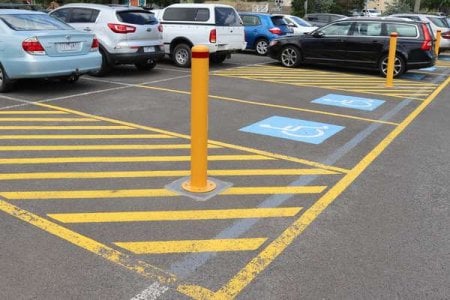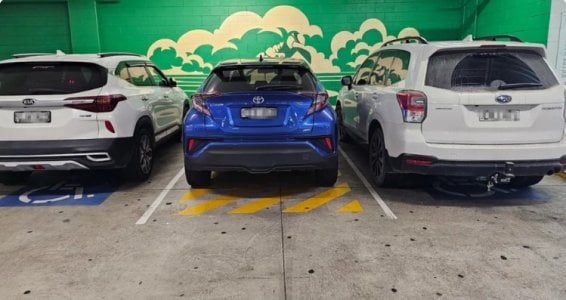Frustrated wheelchair user ramps up criticism over inconsiderate parking
- Replies 12
In a world that's constantly moving, it's easy to overlook the challenges faced by those with mobility issues.
However, for wheelchair users, the daily struggle to find suitable parking is a reality that's impossible to ignore.
A recent outcry against 'inconsiderate' drivers who park on the yellow lines beside accessibility bays has brought to light a pervasive issue that affects millions of Australians with disabilities.
Dane Procter from Newcastle, New South Wales, expressed his frustration at discovering vehicles parked on the designated lines.
They are intended to accommodate individuals needing additional space to enter or exit their cars, as well as to retrieve any necessary equipment.
‘As a wheelchair user, it can be quite frustrating to even find a disabled park,’ he lamented.
‘I've been complaining to my local (Newcastle) members, council, and Centrelink about there not being any disabled parking at the Newcastle Centrelink office.’

Procter's frustration was echoed by many wheelchair users who find themselves in similar predicaments.
Advocates emphasised that a common misconception exists regarding the purpose of these bays, which are designated for individuals with accessibility needs who necessitate close proximity parking to their destination.
The issue of parking inaccessibility is not just a matter of inconvenience; it's a matter of legality and respect.
In February, a Sydney woman faced a hefty fine for parking in a disability bay.
While her circumstances were urgent, with a friend in labour, disability advocate and wheelchair user James Wood pointed out that such actions are 'not cool' and that everyone should strive to be more considerate.
The need for disabled parking spaces is not a convenience but a necessity for those who cannot walk or push a wheelchair over long distances.
‘People need to understand the reason for those car spaces is that someone with a disability parking permit can't walk or push a wheelchair long distances,’ Wood asserted at the time.
‘If I had to visit the place where she was parked and couldn't find a spot, then saw her there, I would have said something.’
‘If she gave the excuse that her friend was in labour, I'd have told her “not good enough”,’ he added.
Following Procter's social media post, Australians flooded the platform with their own accounts and experiences.
‘It’s like people expect disabled people to easily get out of the car and walk through the tight space they’ve left,’ one commenter said.
‘They're part of the car park spot,’ another agreed.
A woman also shared a photograph depicting a driver parked on the yellow lines within a parking garage.
‘When I see s*** like this, it gets me fuming,’ she wrote.

As frustrations mount over inconsiderate parking behaviour, stories of individuals facing challenges due to selfish parking acts continue to surface.
From wheelchair users struggling to access their vehicles to delivery drivers sparking outrage with their actions, the need for greater awareness and consideration in parking etiquette becomes increasingly apparent.
These incidents underscore the importance of empathy and mindfulness in shared spaces, prompting a call for collective efforts to foster a more inclusive and respectful environment for all.
 Have you witnessed someone parking too close to a disabled bay? How did you address the situation? Share your experiences and thoughts in the comments below.
Have you witnessed someone parking too close to a disabled bay? How did you address the situation? Share your experiences and thoughts in the comments below.
However, for wheelchair users, the daily struggle to find suitable parking is a reality that's impossible to ignore.
A recent outcry against 'inconsiderate' drivers who park on the yellow lines beside accessibility bays has brought to light a pervasive issue that affects millions of Australians with disabilities.
Dane Procter from Newcastle, New South Wales, expressed his frustration at discovering vehicles parked on the designated lines.
They are intended to accommodate individuals needing additional space to enter or exit their cars, as well as to retrieve any necessary equipment.
‘As a wheelchair user, it can be quite frustrating to even find a disabled park,’ he lamented.
‘I've been complaining to my local (Newcastle) members, council, and Centrelink about there not being any disabled parking at the Newcastle Centrelink office.’

Dane Procter voiced his frustration towards thoughtless drivers who park on the yellow lines adjacent to accessibility bays, obstructing access for wheelchair users. Credits: Shutterstock
Procter's frustration was echoed by many wheelchair users who find themselves in similar predicaments.
Advocates emphasised that a common misconception exists regarding the purpose of these bays, which are designated for individuals with accessibility needs who necessitate close proximity parking to their destination.
The issue of parking inaccessibility is not just a matter of inconvenience; it's a matter of legality and respect.
In February, a Sydney woman faced a hefty fine for parking in a disability bay.
While her circumstances were urgent, with a friend in labour, disability advocate and wheelchair user James Wood pointed out that such actions are 'not cool' and that everyone should strive to be more considerate.
The need for disabled parking spaces is not a convenience but a necessity for those who cannot walk or push a wheelchair over long distances.
‘People need to understand the reason for those car spaces is that someone with a disability parking permit can't walk or push a wheelchair long distances,’ Wood asserted at the time.
‘If I had to visit the place where she was parked and couldn't find a spot, then saw her there, I would have said something.’
‘If she gave the excuse that her friend was in labour, I'd have told her “not good enough”,’ he added.
Following Procter's social media post, Australians flooded the platform with their own accounts and experiences.
‘It’s like people expect disabled people to easily get out of the car and walk through the tight space they’ve left,’ one commenter said.
‘They're part of the car park spot,’ another agreed.
A woman also shared a photograph depicting a driver parked on the yellow lines within a parking garage.
‘When I see s*** like this, it gets me fuming,’ she wrote.

A woman said that when she sees drivers doing this (pictured), it makes her angry. Credits: Facebook
As frustrations mount over inconsiderate parking behaviour, stories of individuals facing challenges due to selfish parking acts continue to surface.
From wheelchair users struggling to access their vehicles to delivery drivers sparking outrage with their actions, the need for greater awareness and consideration in parking etiquette becomes increasingly apparent.
These incidents underscore the importance of empathy and mindfulness in shared spaces, prompting a call for collective efforts to foster a more inclusive and respectful environment for all.
Key Takeaways
- Dane Procter from Newcastle expressed frustration over inconsiderate drivers parking on the yellow lines beside accessibility bays, impeding access for wheelchair users.
- Procter has been vocal in his local community and with authorities about the lack of disabled parking, particularly at the Newcastle Centrelink office.
- Advocates and wheelchair users were calling out drivers who misuse parking spots designated for those with accessibility needs, with penalties being issued for such offences.
- The incident sparked online discussion, with many sharing their own experiences and highlighting the importance of these bays and the yellow lines for providing necessary space for individuals with disabilities.







